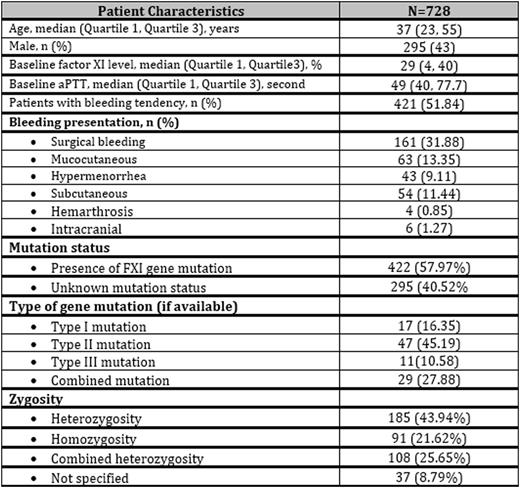Abstract
Background: Congenital factor XI (FXI) deficiency is a rare inherited bleeding disorder caused by mutation of the FXI gene. Clinical manifestation and bleeding severity of FXI deficiency are varied. To our best knowledge, there are no studies investigating the predictors of bleeding in these patient population. Our study aims to investigate the clinical presentation of congenital FXI deficiency and to identify clinical, biological, and genetic determinants of bleeding.
Methods: We conducted a systematic search in MEDLINE and EMBASE databases from inception to March 2016. We included the studies of congenital FXI deficiency. In terms of study design, we included prospective or retrospective studies as well as case series and case reports. We collected clinical characteristics of the patients including age, sex, family history of FXI deficiency, family history of bleeding, and site of bleeding. We also collected the laboratories including baseline aPTT, FXI level, and genetic test results.
Results: There were 141 studies included in this review, involving 728 patients with reported congenital FXI deficiency. Forty-three percent of the patients were male. Clinical characteristics of the patients was demonstrated in Table 1. Of these, 421 (51.84%) patients had bleeding tendency. Surgical bleeding was the most common bleeding manifestation (31.88%), following bymucocutaneous bleeding (13.35%) and hypermenorrhea (9.11%). Factor XI gene mutation was found in 422 patients (57.97%). Type II mutation was the most common reported mutation (45.19%). With regards tozygosity of patients with gene mutation, 43.94% of patients had heterozygosity of factor XI gene mutation. Univariate analysis revealed that patients with baseline factor XI level less than 25% were associated with higher risk of bleeding (odd ratio 1.48 (95% confidence interval [CI]; 1.05 to 2.09). In addition, patients with combined mutation were at higher risk of bleeding when compared to patients with single mutation (odd ratio 2.83 (95% CI; 1.09-7.39).
Conclusion: Our study found that patients with factor XI deficiency has mild bleeding manifestation. Half of the patients do not experience bleeding tendency. Surgical bleeding is the most common presentation in these patient population and likely to be the first bleeding symptom. Baseline factor XI level less than 25% is the predictor of bleeders as well as combined gene mutation.
No relevant conflicts of interest to declare.
Author notes
Asterisk with author names denotes non-ASH members.


This feature is available to Subscribers Only
Sign In or Create an Account Close Modal